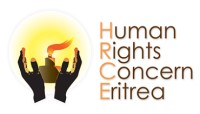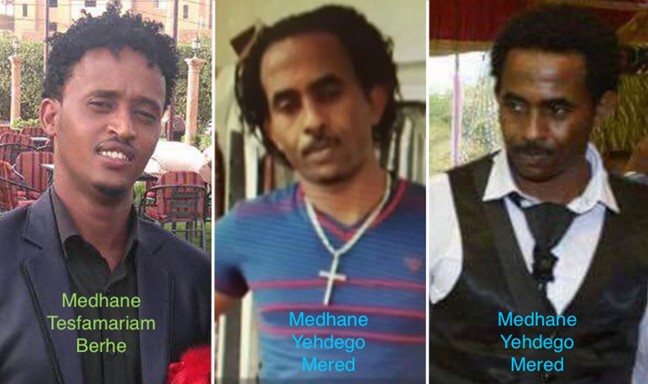

Prolonging a Miscarriage of Justice
It will soon be a year and a half of unjust imprisonment for Medhanie Tesfamariam Berhe, the man extradited from Sudan in a disturbing case of mistaken identity during a high profile joint investigation by the British National Crime Agency (NCA), and the Italian Palermo magistrate. The situation has gone beyond being an embarrassing mistake to becoming a grave miscarriage of justice against an innocent man who found himself in a foreign country after fleeing persecution in Eritrea, his home country. Despite all evidence to the contrary, he remains accused of being Medhanie Yehdego Mered and imprisoned as one of the human smugglers most wanted by European authorities. He is being tried in Italian courts; however, the prosecution keeps asking for the case to be heard by different courts and as a result the trial has been restarted and is now being heard by a fourth judge. Henceforth in this article Medhanie Tesfamariam Berhe will be referred to as “the Suspect” and Medhanie Yehdego Mered as “the Smuggler”, to avoid confusion and to better distinguish between the man in custody and the person at large.
The extradition of the Suspect was hailed as a great victory by the Italian and British authorities, who believed they had succeeded in arresting a man at the centre of an investigation they had been conducting for several years. The investigation was part of the initiative European authorities had started known as “the Khartoum process”, which focused on stopping the migration of persons from Africa to Europe. The Khartoum process has, justly, been much criticized since its inception. Although it contains much rhetoric about saving lives, it is mainly a pact with the leaders of countries whose repression causes their citizens flee their homes. As such, the deals under this programme give millions of euros to presidents accused of committing crimes against humanity, war crimes and genocide- men like Isaias Afewerki of Eritrea and Omar Al Bashir of Sudan.
Despite their best efforts, however, the intelligence gathered by the Italian and British teams appears to have been flawed. Not only did it led to the arrest of the wrong person; it also lacked a basic understanding of how the smuggling network actually operates. The Suspect himself had to explain to the judges who were to try him how migrants pay smugglers to get them across borders and onto boats to cross the Mediterranean.
The Suspect has cooperated fully with his captors from the beginning, giving them full access to his email and Facebook accounts. He is being imprisoned and tried in Palermo by the Italian authorities. Within hours of the news of his capture breaking, hundreds of Eritreans contacted Radio Erena, a Paris-based, Eritrean radio station stating that the wrong person had been arrested. The Guardian has been following the case ever since. In a series of articles, the paper reported on all the evidence that has come forth since the arrest. It has now become evident that what the Suspect told his lawyer and the prosecutors, while cooperating fully, matches the evidence that has emerged in the last year and a half. Another newspaper, The New Yorker, has also reported in depth about the case.
When he was arrested the Suspect had been beaten and asked for a bribe by Sudanese authorities who seized his passport in Khartoum. It was when they realised they couldn’t get any money from him that they handed him over to Interpol as the Smuggler for extradition, without also handing them his ID. However, despite losing his passport, the Suspect managed to get various documents from his family to prove his identity.
A witness, who was later deemed to be unreliable, incriminated the Suspect by testifying he saw him at a wedding in 2013, only for the wedding certificate and more photos to be produced by friends and family of the Suspect, showing the wedding he was seen in was actually held in 2015. There is also concern about tampering with trial evidence. For example, the Suspect was asked if he had ever been in Libya and he answered “No” and can be heard on audio recordings saying so, but the official court transcripts say he said “Yes”.
In the article written by The New Yorker, the Italian prosecutor Ferrara is quoted as saying “The important thing is that you can demonstrate that that evidence [i.e. the intelligence from the investigation] led to that person”. Ferrara and his team seem not to follow their own advice, however, as the evidence has now shown that the intelligence they had, at least for the arrest, was misleading. Firstly, they failed to take into consideration the photo they had of the Smuggler: during the investigation a witness had already identified the Smuggler in a picture and the Suspect looks considerably different from the Smuggler. When the Suspect was handed over in Sudan, alarm bells ought to have been ringing. They, by then should have realised that the available evidence clearly illustrated who the Suspect is, and that the Suspect and the Smuggler are different people.
The Italian authorities now have copies of the Suspect’s baptism certificate, his photos as a child, his secondary-school report card, a scan of his government issued ID card, school records that show he was studying in Eritrea in 2010 (aged 22 at that time) when the Smuggler was sending people through Sinai, an official form from the Eritrean Ministry of Health showing the Suspect was treated in Eritrea for an injury at a time when the Smuggler was known to be in Libya by the Italian prosecutors, a letter from the Suspect’s employer attesting that the Suspect was working in Eritrea from May 2013 to November 2014 (when the Smuggler was known to be active outside Eritrea), and documents from the Suspect’s family members verifying their identities. A lot of this evidence indicates clearly the age difference of 6 years and that the Suspect was still in school when the Smuggler was active in the human trafficking business.
In a rare cooperation with refugees, the Eritrean government even sent a letter confirming the Suspect is indeed Medhanie Tesfmariam Berhe and not Medhanie Yehdego Mered, who is the Smuggler the Italian authorities had been hunting for. In a desperate attempt to save her son, the Suspect’s mother travelled from Eritrea to Italy to provide DNA evidence to show he is her son, but this evidence was not admitted in court because the prosecution refused to consider it. The latest development in terms of evidence supporting the Suspect’s claim of innocence is a forensic voice analysis showing the Suspect’s voice is markedly different from that of the Smuggler.
Why is the Suspect still in custody? It seems that the authorities are detaining the Suspect further in the hopes of finding damning evidence. Only the Italian authorities and the UK’s NCA know the real answer, since they refuse to answer questions, remove articles from their websites and wiretap witnesses and journalists following the case. Whatever the reason, it has become undeniable that there is a gross miscarriage of justice at hand. This gross violation of rights of despite the fact hundreds have testified of his innocence is yet another blunder in the overall approach to migration that Italy, the UK and other European countries have taken.
This case of mistaken identity is the only extradition that has happened under the wider set of deals known as the Khartoum Process. The agreements which have been made between the governments involved in the Khartoum process, and the funding going with them, have been widely criticised, and the flaws in the process have been pointed out by various human rights organisations, including Human Rights Concern Eritrea (HRCE), over the past couple of years. Other unwanted side effects of such shaky deals have been the arming of Libyans who are currently torturing, raping and selling ‘black’ Africans in modern-day slave trade.
The European governments involved in this appalling ASE of mistaken identity must acknowledge their error and grant Mr. Berhe the justice he deserves. As embarrassing as it may have been so far, it will only become a worse loss of face and credibility if they continue to keep Mr. Berhe imprisoned and delay his trial by shifting his case from court to court.
Mr. Berhe will need to be compensated for his loss of liberty, possible trauma and distress and the years taken from him which he should have spent building a new life once he escaped the oppressive regime in Eritrea.
HRCE calls for the Italian authorities to give Mr. Berhe justice by holding a fair and transparent trial without further delay, a trial in which evidence is not manipulated, witnesses are not discouraged from testifying, journalists are not intimidated, and all information to hand, including conclusive DNA evidence, is seriously taken into consideration.
Human Rights Concern – Eritrea (HRCE)
This email address is being protected from spambots. You need JavaScript enabled to view it.
5 December 2017